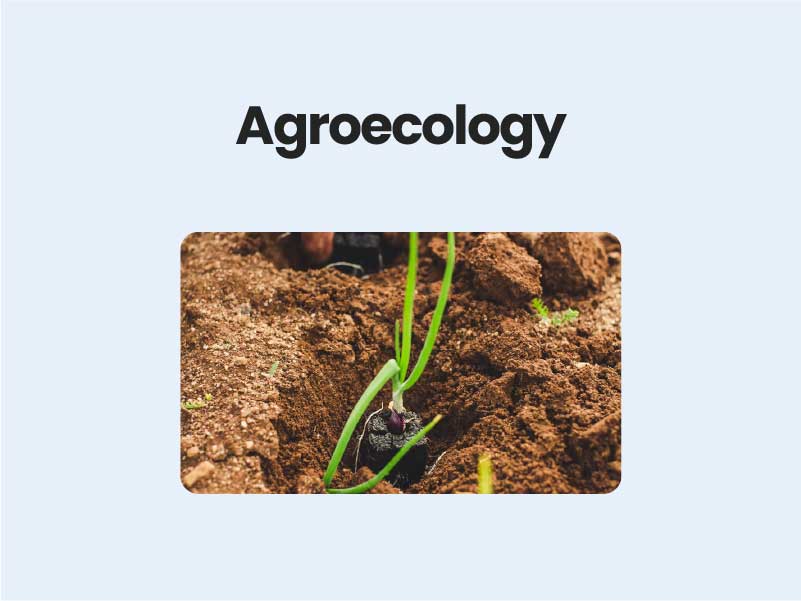Companion@360 → 7 Month programme to sharpen your writing skills → REGISTER NOW

Agroecology
- Agroecology is recognised worldwide as a system that enhances fertile landscapes, increases yields, restores soil health and biodiversity, promotes climate resilience and improves farmers’ well-being.
- Its practices are supported by many agricultural scientists, the Food and Agriculture Organization, the Intergovernmental Panel on Climate Change, farmers’ groups and several NGOs.
- Agroecology is the solution proposed to the current industrial food systems which are failing and harming the environment.
What is Agroecology?
- Agroecology is the study of ecological processes applied to agricultural production systems.
- Application of ecological principles to agroecosystems can help in developing novel management approaches and techniques in agriculture systems.
- The field of agroecology is not associated with any one particular method of farming, whether it be organic, integrated, or conventional, intensive or extensive. However, it has much more in common with organic and integrated farming.
- Agroecology is not against the use of technology in agriculture but assesses how, when, and if technology can be used in conjunction with natural, social and human assets.
- It recognizes that there is no universal formula or recipe for the success and maximum well-being of an agroecosystem and is context- or site-specific.
- Agroecology is not defined by certain management practices, instead, it studies questions related to the four system properties of agroecosystems:
- productivity,
- stability,
- sustainability and
- equitability.
- Agroecologists see all four properties as interconnected and integral to the success of an agroecosystem and study them through an interdisciplinary lens,
- using natural sciences to understand elements of agroecosystems as well as
- using social sciences to understand the effects of farming practices on rural communities, economic constraints to developing new production methods, or cultural factors determining farming practices.
- Agroecologists do not limit themselves to the study of agroecosystems at any one scale: gene- organism- population- community- ecosystem- landscape- biome, field- farm- community- region- state- country- continent- global.
Read Also National Clean Air Programme
What are the benefits of Agroecology?
- Agroecology is all about the design and management of sustainable farms. It provides a robust set of solutions to the environmental and economic pressures facing agriculture today.
- The current industrial food system has gone off the rails, increasingly dependent on health-harming pesticides and other chemical inputs that degrade soil, threaten pollinator populations and pollute water.
- By shifting farming policies and practices to embrace agroecology, we can create a food system to sustain this and future generations — one rooted in productivity, resilience, equity and sustainability.
- Agroecological farming can double food production within ten years without harming the environment.
- Agroecology recognizes the multifunctional dimensions of agriculture – which not only produces food, jobs and economic well-being but also creates cultural, social and environmental benefits.
- Agroecology also protects and provides ecosystem services like pollination, natural pest control, nutrient and water cycling and erosion control.
Agroecological farming has been shown to
- Increase ecological resilience, especially with respect to volatile weather conditions;
- Improve health and nutrition through more diverse, nutritious and fresh diets and reduced incidence of pesticide poisonings and pesticide-related diseases;
- Conserve biodiversity and natural resources such as soil organic matter, water, crop genetic diversity and natural enemies of pests;
- Improve economic stability with more diverse sources of income, the spread of labour needs and production over time, and reduced vulnerability to commodity price swings; and
- Mitigate effects of climate change through reduced reliance on fossil fuels and fossil fuel-based agricultural inputs, increased carbon sequestration and water capture in soil.
Issues
Threats from Powerful Elites
- Farming sector in India has an overarching influence of powerful lobbies with vested interests and connections to deep pockets which include fossil fuel, fertilizer and seed companies as well as scientists with funding connections to agribusiness.
- These lobbies perceive large-scale transitions to agroecology as a substantial threat to their influence on farming systems. Hence these powerful elites are lobbying against natural farming which is still a small player in the margins.
- For example, recently, the National Academy of Agricultural Sciences, based on a brainstorming session that included industry representatives has sent a letter to the Prime Minister opposing Zero Budget Natural Farming (ZBNF).
Zero Budget Natural Farming
- Zero budget natural farming (ZBNF) is a method of chemical-free agriculture drawing from traditional Indian practices. It is a form of agroecology as it promotes ecological practices to improve productivity while protecting the environment.
- It was originally promoted by Maharashtrian agriculturist and Padma Shri recipient Subhash Palekar, who developed it in the mid-1990s as an alternative to the Green Revolution’s methods driven by chemical fertilizers and pesticides and intensive irrigation.
- Instead of commercially produced chemical inputs, the ZBNF promotes the application of jeevamrutha — a mixture of fresh desi cow dung and aged desi cow urine, jaggery, pulse flour, water and soil — on farmland.
- This is a fermented microbial culture that adds nutrients to the soil, and acts as a catalytic agent to promote the activity of microorganisms and earthworms in the soil.
- A similar mixture, called bijamrita, is used to treat seeds, while concoctions using neem leaves and pulp, tobacco and green chillies are prepared for insect and pest management.
- The ZBNF method also promotes soil aeration, minimal watering, intercropping, bunds and topsoil mulching and discourages intensive irrigation and deep ploughing.
Conclusion
- Agroecology is a knowledge-intensive & inclusive system at the same time improves the adaptive capacity of agroecosystems and reduces vulnerability to natural disasters, climate change impacts, and new and emerging environmental and economic system stresses and shocks.
- It could be the answer to our woes about food security in a changing climate, increasing natural disasters and growing population.


